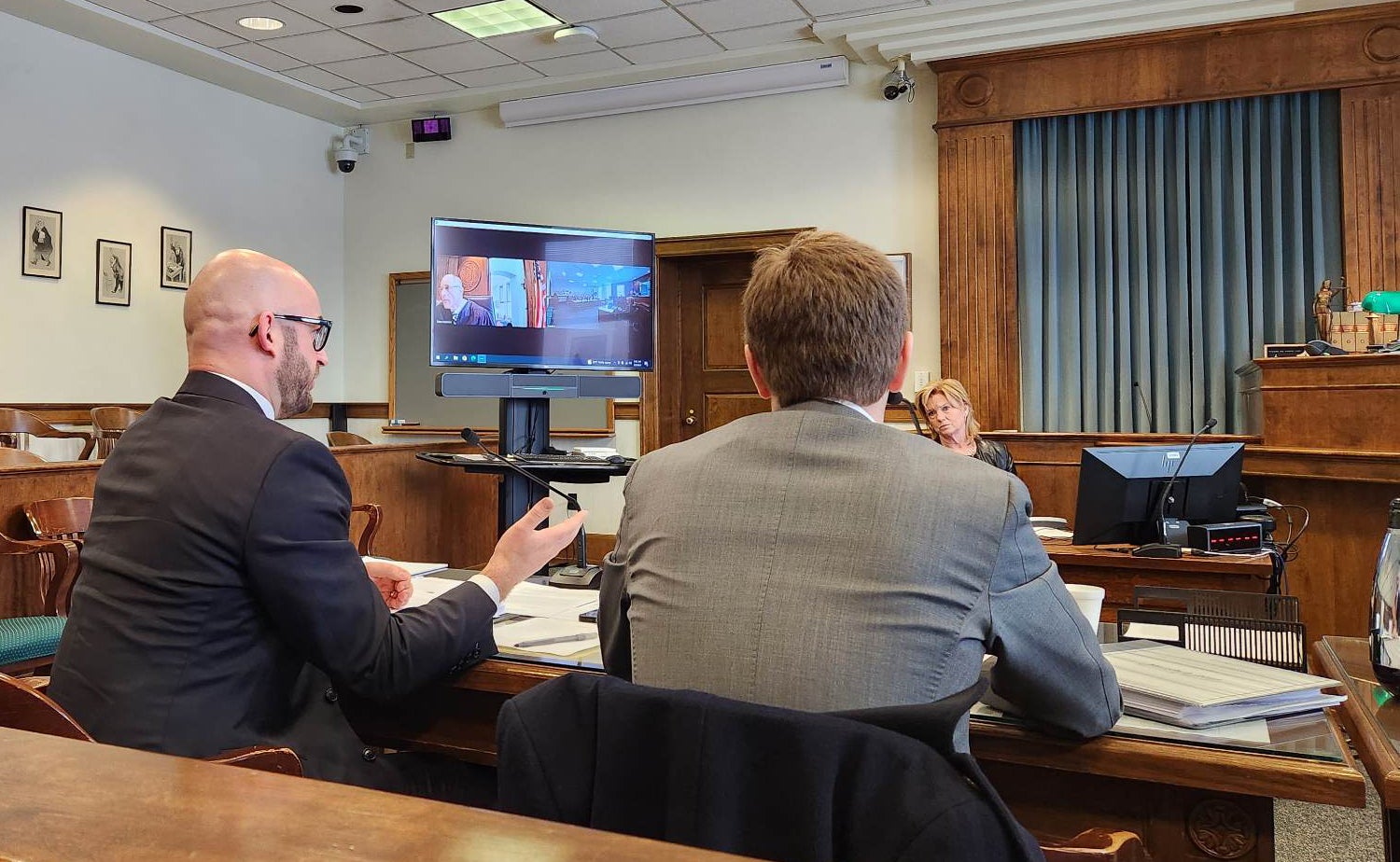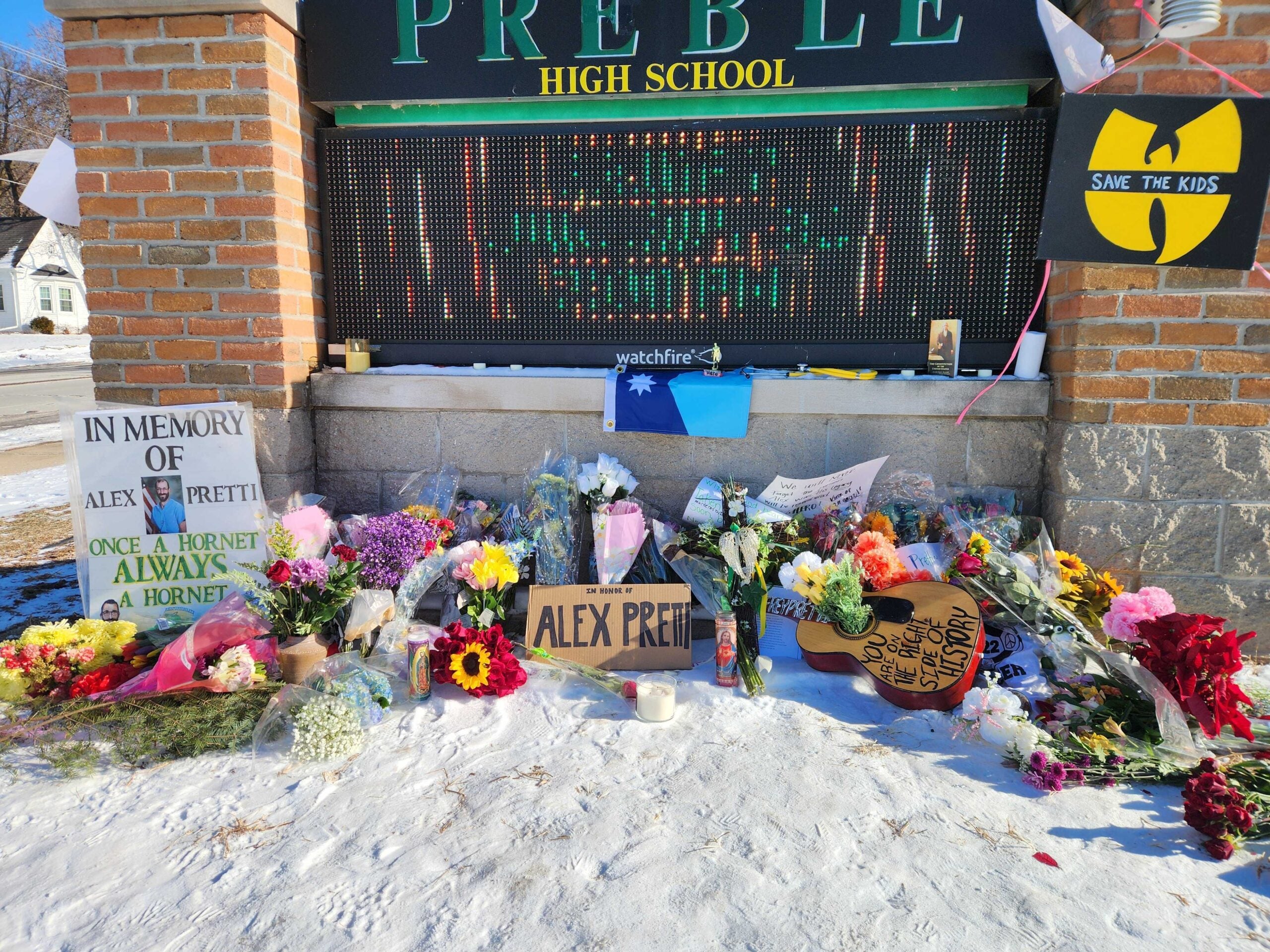A Brown County Circuit Court Judge Thursday ordered the city of Green Bay to stop using audio devices in its city hall security system until the legal debate over the practice has ended.
Judge Marc Hammer’s temporary order also requires the city not release any audio records while litigation is ongoing, and requires plaintiffs reveal the name of a Jane Doe who is suing the city to defense council.
The Wisconsin State Senate — along with state Sen. André Jacque, R-De Pere, former Green Bay Alder Anthony Theisen and an unnamed Jane Doe — sued Green Bay and Mayor Eric Genrich last week Tuesday.
News with a little more humanity
WPR’s “Wisconsin Today” newsletter keeps you connected to the state you love without feeling overwhelmed. No paywall. No agenda. No corporate filter.
The suit argues the city’s use of audio devices violates Wisconsin’s Electronic Surveillance Control Law, the state constitution, the U.S. Constitution and other state statutes.
According to the city, the audio recording devices were installed in three of the 14 security cameras in city hall starting in late 2021. City staff were notified when the audio devices were added, but Green Bay did not install signage notifying the public they could be recorded until last month.
While Hammer sided with those suing the city in granting a temporary court order, he questioned the timing of the lawsuit as he believed the city’s use of recording equipment was known months ago. He said the situation appeared to be politically motivated.
“I’m concerned that there was some type of underhandedness or strategy in waiting until after the city primary and before the city election to dirty up the mayor — and that’s unfortunate,” Hammer said. “That’s extremely disappointing, quite frankly, to use a fundamental right that our people have as a political tool.”
City says security upgrades were in response to threatening interactions
In a legal brief filed Wednesday, lawyers for the city said the audio devices were installed in response to threatening incidents at city hall. The brief detailed three such incidents, two involving city staff and one involving a member of the press.
In the first situation, three people “verbally assaulted” a city staff member in the City Council chambers after a June 2021 council meeting, court documents said.
The second incident, in November 2021, involved a reporter for the Green Bay Press-Gazette being “isolated, threatened and verbally assaulted by members of the public” in a hallway after a council meeting.
“These persons stood over her, insulted her, claimed that she should not be in the City, questioned her education and made other degrading remarks,” court documents said.
In the third incident detailed in the brief, a member of the public “verbally assaulted” staff in the City Clerk’s office after someone delivered an absentee ballot in the April 2022 election. The voter dropping off the ballot witnessed the person shouting at the clerk.
“The assault caused the voter to cry and visibly shake to the point that staff needed to escort her to her vehicle,” the brief said.
Green Bay isn’t the only government entity using audio devices
While Green Bay’s use of audio recording equipment in its city hall security system has come under scrutiny over the last month, it isn’t the only government entity in Wisconsin using audio devices.
There are three cameras that can record audio in public areas of the Brown County Sheriff’s Office facility, according to Brown County Corporation Counsel David Hemery.
Hemery told Wisconsin Public Radio the cameras have signage that states, “Notice: Audio/video recording in progress.” One is located in the foyer, while the other two are in the lobby, he said.
The city of Racine, meanwhile, has seven audio/visual cameras within its city hall and police department that are visible to the public, according to Maxwell Love, a communications specialist for the Racine Mayor’s Office.
“These cameras record both audio and video, and the city does not have any standalone audio recording devices,” Love said in a statement to WPR. “The locations of the video cameras were carefully selected to ensure safety and security, both in areas where staff handle money from the public, or there is a safety consideration.”
Outside Wisconsin, the district attorney’s office in Nashville, Tennessee, and the city clerk’s office in East Providence, Rhode Island, also use audio recording devices, according to the American Civil Liberties Union, or ACLU.
“Audio surveillance can be significantly more intrusive than video surveillance,” Jay Stanley, senior policy analyst for the ACLU, wrote in a Feb. 27 article. “If you’re walking down the street talking about wild times with an old friend, the video will probably be quite boring — just two people walking down the street — but the audio could be compromising indeed.”
Although other government entities may use similar devices, judge Hammer said he was only concerned about the city of Green Bay.
“(When) you talk about a reasonable expectation of privacy, it must be based on the community in which we live,” he said. “It can’t be, necessarily, a nationwide or statewide standard.”
Court debate revolves around ‘reasonable expectation of privacy’
During the hearing, attorneys for the state Senate and the city differed on their opinions of whether someone should have a “reasonable expectation of privacy” in the hallways of Green Bay city hall.
“We think it’s an emergency when the government surveils citizens and archives their conversations for later use,” said Ryan Walsh, an attorney for the state Senate.
However, Ted Waskowski, an attorney representing the city, said there were plenty of other spaces in city hall where people could have a private conversation beyond the three specific areas where the audio devices were located.
In the end, Hammer said he believed members of the public should have a reasonable expectation of privacy in city hall hallways and required the city to stop using audio devices while litigation continues.
“The biggest concern here is that people thinking that they’re having conversations privately with others have the capacity of being monitored by the government,” he said. “I would agree with you that the sound may capture violent episodes, but I’m not certain that it doesn’t cover or capture private conversations.”
Wisconsin Public Radio, © Copyright 2026, Board of Regents of the University of Wisconsin System and Wisconsin Educational Communications Board.







